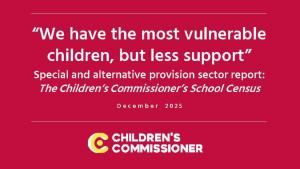As Children’s Commissioner I strongly believe that every child has the right to an excellent education no matter who they are or where they live. Young people have also told me how important a good education is to them.
Over the last four years I have heard from a million children through my surveys, The Big Ask and The Big Ambition, about their experiences of school.
Last year The Big Ambition results showed that children still deeply value their education. 75% said they had great teachers who supported them, and 60% said they enjoy school or college. And my 2021 The Big Ask survey showed that 52% of 9-to 17-year-olds said that a good education was important for their
future.
While most children told me that they want to be in school, they want to learn, and they understand that education is the key to their future, some children also talked about the barriers that prevent them from getting a good education.
These barriers – including access to suitable support for mental health and special educational needs and disabilities – are having a significant impact on attendance. Latest statistics show that there are 1.7 million children either persistently or severely absent from school.
In these cases, alternative provision schools can offer a lifeline. When done well, they can re-engage children who have fallen out of the system and help them find their spark again, but this report also highlights a concerning and growing problem: the widespread use of unregistered alternative provision.
My report found that there were 24,325 children in unregistered AP in 2023/2024 placed across 27,091 placements – one child could be in multiple placements – commissioned by either schools or local authorities.
This is comparable in scale to the number of children in registered state-funded AP.
My report found that there were 91 unregistered alternative provision settings operating as potential illegal schools in January 2023/24, attended by over 1,000 children.
Some examples of unregistered AP, including one-to-one tuition, smaller vocational settings, and therapeutic provision, can offer significant benefits, providing holistic care and life skills education that registered schools, including registered alternative provision settings, may not be able to offer.
However, because they are not registered as schools or colleges anyone can set up an unregistered AP setting which can create significant risks to children’s safety and to the quality of their and learning.
These unregistered settings operate outside the oversight of Ofsted or the Department for Education.
There is no national register. No standardised inspection regime.
There is no guarantee that staff are properly trained, or even that they have passed the most basic safeguarding checks. In the worst cases, these settings have been run by individuals with serious criminal histories — and in some appalling instances, have placed children at risk of exploitation.
That is simply not acceptable. As Children’s Commissioner, I want to see a system that protects children and ensures they receive a high-quality education — wherever that happens.
That means introducing a national register for all unregistered alternative provision providers, so we know where children are and who is educating them.
It means requiring providers to meet national safeguarding and education standards before they can operate. We also need to create a clear inspection framework, so children, families, and commissioners can trust the placements being made.
Crucially, it also means removing the barriers that prevent high-quality providers from registering.
I have seen inspiring examples of unregistered provision — often small, community-based, and deeply committed to children — who are doing everything right but lack a clear path to becoming part of the regulated system. We should be supporting those providers, not shutting them out.
This report sets out a blueprint for change which puts children first. No child should be left in a setting that puts them at risk and every child — whatever their background, needs or experience — deserves the safety, care, and opportunity that a good education provides.



